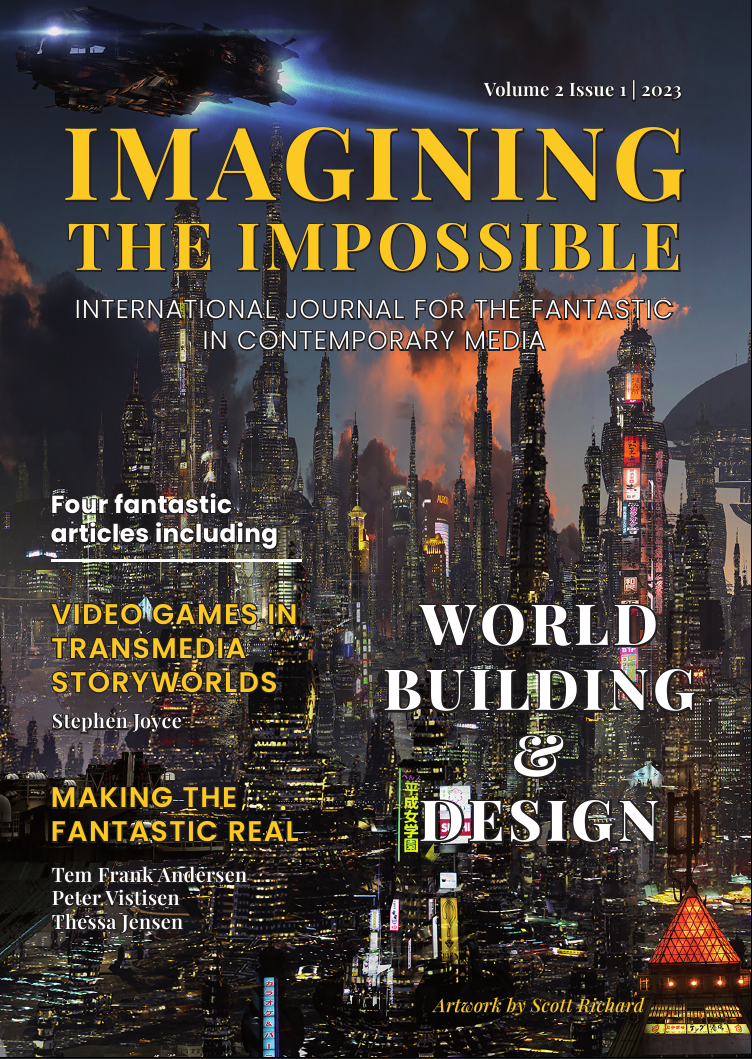Unworlding in Nameless
The Negation of World-building
DOI:
https://doi.org/10.7146/imaginingtheimpossible.130077Keywords:
comics, compossibility, incompossibility, Leibniz, unnarration, unworlding, weird fiction, world-buildingAbstract
World-building has thrived as a new field for scholars interested in fantastic fiction since it allows for new insights into how imaginary worlds are actualized other than simply the formal devices that render fantastical worlds different from non-fantastical ones. However, there are things that cannot be told and there are things that should not be told — these are the reaches that much weird fiction likes to explore. In the vocabulary of world-building, we would say that readers are never given access to a fully coherent and consistent imaginary world. The process of Nameless is what I identify as the process of unworlding — when the imaginary world is filled with contradictions and impossibilities and break any attempt at constructing a system or structure.
References
Alber, Jan. Unnatural Narrative: Impossible Worlds in Fiction and Drama. Lincoln: University of Nebraska Press, 2016.
Botting, Fred. “Unrealism: Critical Reflections in Popular Genre: Critical Reflections in Popular Genre.” Genre: Forms of Discourse and Culture 51.2 (2018): 183-207.
Christiansen, Steen Ledet. The New Cinematic Weird: Atmospheres and Worldings. Lanham: Lexington Books, 2021.
Fimi, Dimitra and Andrew Higgins. “Invented Languages.” In The Routledge Companion to Imaginary Worlds, edited by Mark J.P. Wolf, 21-29. London: Routledge, 2017.
Fisher, Mark. The Weird and the Eerie. London: Repeater Books, 2016.
Fresnault-Deruelle, Pierre. “From Linear to Tabular”. In The French Comics Theory Reader, edited by Ann Miller and Bart Beaty, 121-138. Leuven University Press, 2014.
Hayot, Eric. “On Literary Worlds.” Modern Language Quarterly 72, no. 2 (2011), 129-161.
McHale, Brian. “Speculative Fiction, or, Literal Narratology.” In The Edinburgh Companion to Contemporary Narrative Theories, edited by Zara Dinnen and Robyn Warhol, 317-331. Edinburgh: Edinburgh University Press, 2018.
Ndalianis, Angela. “The Frenzy of the Visible in Comic Book Worlds.” Animation: An Interdisciplinary Journal 4, no. 4 (2009), 237-248.
Richardson, Brian. Unnatural Voices: Extreme Narration in Modern and Contemporary Fiction. Columbus: Ohio State University Press, 2006.
Ryan, Marie-Laure. Possible Worlds, Artificial Intelligence, and Narrative Theory. Indianapolis: Indiana University Press, 1991.
Stewart, Kathleen. “Atmospheric Attunements.” Environment and Planning D: Society and Space 29, no. 3 (2011): 445-453.
Warhol, Robyn R. “Neonarrative; or, How to Render the Unnarratable in Realist Fiction and Contemporary Film.” In A Companion to Narrative Theory, edited by James Phelan and Peter J. Rabinowitz, 220-231. Malden: Blackwell 2005.
Wolf, Mark J.P. Building Imaginary Worlds: The Theory and History of Subcreation. London: Routledge, 2012.
Wolf, Mark J.P. “Preface.” In The Routledge Companion to Imaginary Worlds, edited by Mark J.P. Wolf, xviii-xix. London: Routledge, 2018.
Downloads
Published
How to Cite
Issue
Section
License
Copyright (c) 2023 Steen Ledet Christiansen

This work is licensed under a Creative Commons Attribution 4.0 International License.
Copyright author. CC by license 4.0.




